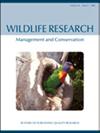应用一个通用的、全面的、基于属性的水孔分类方案来应对基于生态系统的管理挑战
IF 1.6
3区 生物学
Q3 ECOLOGY
引用次数: 1
摘要
本文章由计算机程序翻译,如有差异,请以英文原文为准。
Applying a versatile, comprehensive, attribute-based waterhole classification scheme to ecosystem-based management challenges
ABSTRACT Context. Understanding habitat suitability for feral animals across a landscape is important for conservation planning because the spatial and temporal availability of water provides critical limits to native biodiversity and the processes that threaten it. Previous attempts to support management actions on feral pig populations through predictions of population abundance, distribution and seasonal resource constraints have been confounded by a lack of knowledge, classification and mapping of waterholes – which are critical to their survival. Aims. In this paper, we aimed to apply a waterhole classification scheme for feral pig management to address gaps in our understanding of water and food availability through space and time, at scales relevant to feral animal movement and resource use. Methods. We utilise an attribute-based waterhole classification scheme for ecosystem-based management by defining a waterhole typology of feral pig habitat suitability and applying it spatially. Key results. Five attributes (water permanence, predictability of inundation, oceanic influence, dominant vegetation and shading) reflect many of the critical requirements for feral pig habitat in northern Australia. The attributes directly relate to the environmental constraints that exert population and behavioural pressure on feral pigs. These attributes were applied spatially in a specific hierarchy to group waterholes into 21 types. Conclusions. A waterhole typology that characterises within the context of their suitability for feral pig populations is foundational for systematic adaptive management and monitoring programs that aim to reduce the impact of threatening processes on freshwater ecosystems. Implications. Refining the mapping of important feral pig habitat variables (water and food) will greatly improve modelling approaches that aim to support data-driven management approaches, such as connectivity analysis and estimating population dynamics to inform culling programs. Here we demonstrate a significant increase in overlap with known feral pig distributions using a much smaller mapped effective management area when compared with previous best available spatial products.
求助全文
通过发布文献求助,成功后即可免费获取论文全文。
去求助
来源期刊

Wildlife Research
生物-动物学
CiteScore
4.30
自引率
15.80%
发文量
56
审稿时长
3 months
期刊介绍:
Wildlife Research represents an international forum for the publication of research and debate on the ecology, management and conservation of wild animals in natural and modified habitats. The journal combines basic research in wildlife ecology with advances in science-based management practice. Subject areas include: applied ecology; conservation biology; ecosystem management; management of over-abundant, pest and invasive species; global change and wildlife management; diseases and their impacts on wildlife populations; human dimensions of management and conservation; assessing management outcomes; and the implications of wildlife research for policy development. Readers can expect a range of papers covering well-structured field studies, manipulative experiments, and analytical and modelling studies. All articles aim to improve the practice of wildlife management and contribute conceptual advances to our knowledge and understanding of wildlife ecology.
Wildlife Research is a vital resource for wildlife scientists, students and managers, applied ecologists, conservation biologists, environmental consultants and NGOs and government policy advisors.
Wildlife Research is published with the endorsement of the Commonwealth Scientific and Industrial Research Organisation (CSIRO) and the Australian Academy of Science.
 求助内容:
求助内容: 应助结果提醒方式:
应助结果提醒方式:


